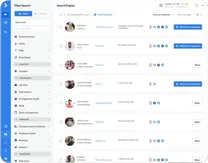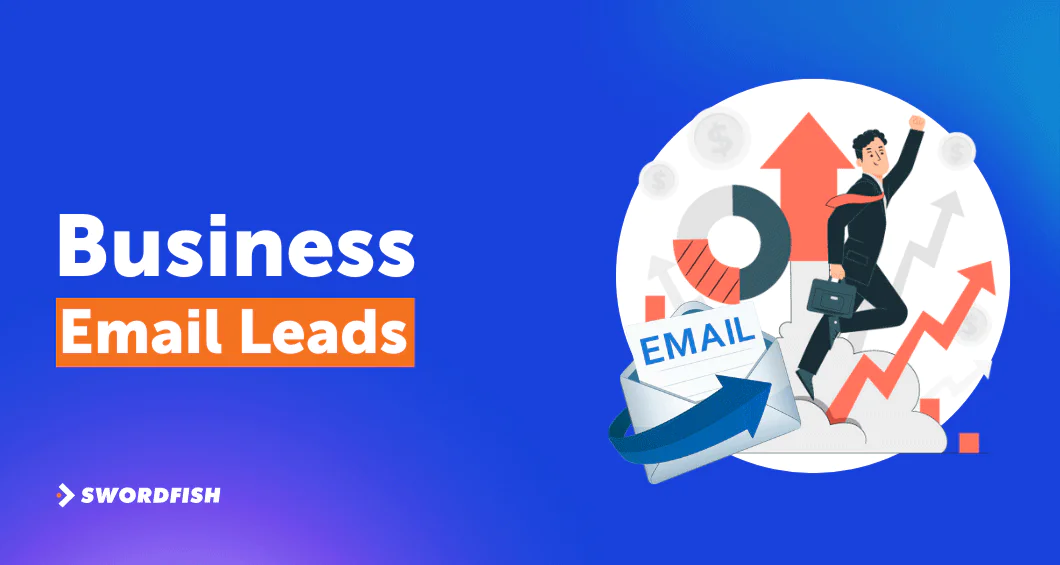
Exploring business email leads is tough but vital for growing your company. Interestingly, 80% of companies see email marketing as a key driver for attracting and keeping customers.
This underscores the importance of continuously reaching out to potential customers with compelling email messages.
Even with many marketing options out there, securing top-notch email leads is still a main goal for numerous businesses. We’ll walk you through effective tactics to gather important business leads and improve your position in the market.
Ready to start? Let’s go.
What are Business Email Leads?
Business email leads are contact details, specifically email addresses, of potential customers or clients interested in a company’s products and services. These leads are important for email marketing campaigns and business development efforts.
The leads of business email play a vital role in connecting companies with potential customers. They are not just valuable to large corporations; small businesses also significantly benefit from email marketing.
In fact, 65% of small businesses use email to reach their customers, demonstrating its effectiveness across various scales of operation.
By targeting specific individuals businesses can customize their marketing efforts, leading to higher engagement rates and increased chances of conversion. This marketing strategy proves that email marketing remains a powerful tool for businesses of all sizes to expand their customer base and drive sales.
How to Get the Best Business Email Leads
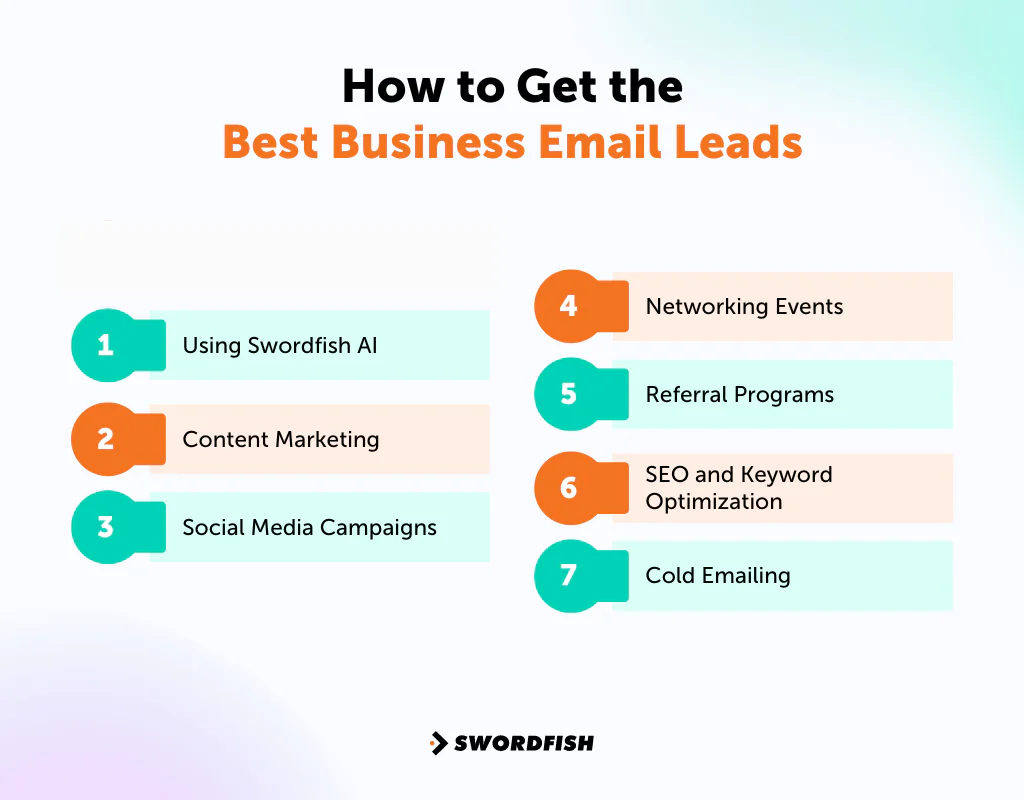
For getting business email leads, start with tools like Swordfish AI to quickly find the contact details you need. Also, get involved in business networking directories and connect with potential leads on social media.
But remember, these are just basic steps. There’s a whole world of other powerful strategies for collecting business email leads waiting to be explored. Let’s dive into those methods to generate leads:
-
Using Swordfish AI: Get the Best Business Email Leads
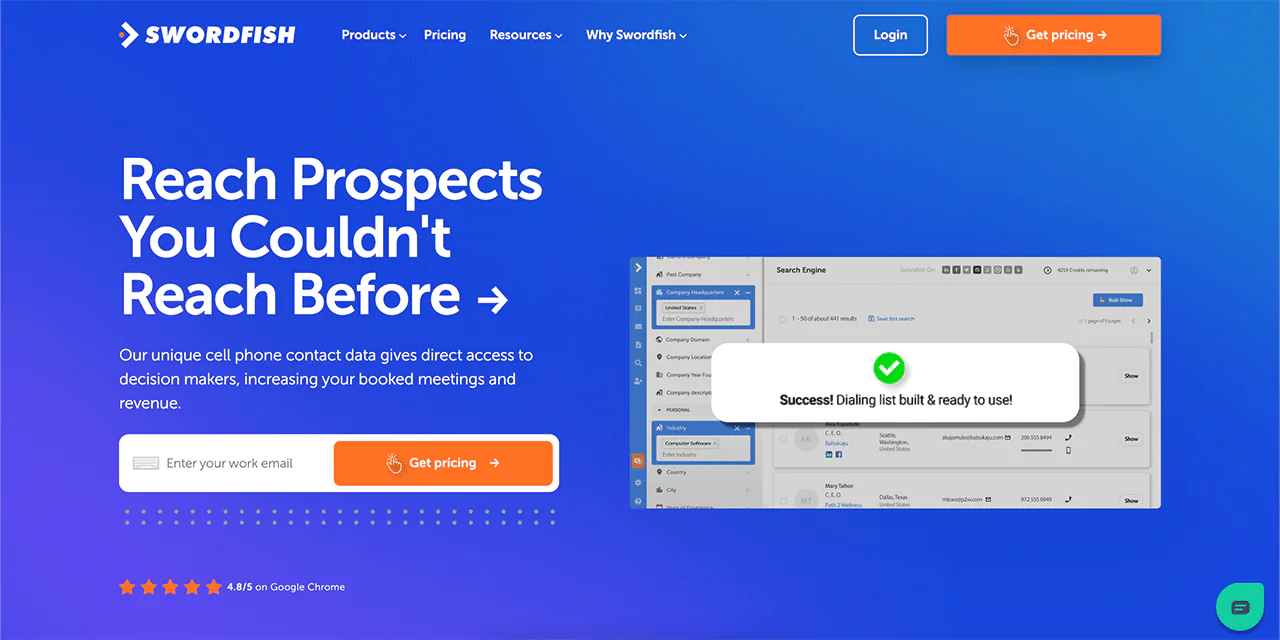
Swordfish AI shines as a top choice for finding high-quality business email leads, with a vast database of over 3.5 billion data points. Its feature of updating data in real-time means you always get the latest contact information, making those details more reliable.
The platform is great at connecting users with the right business contacts, improving the chances of turning leads into real success stories. Moreover, Swordfish AI gives you direct access to cell phone numbers and checks email addresses thoroughly, making it easier and more effective to reach out to potential leads.
Designed with the goal of helping users grow their business networks, Swordfish AI offers tools that make finding new clients straightforward. This mix of features positions Swordfish AI as a must-have for anyone eager to get the best business email leads and build valuable professional relationships.
Key features of Swordfish AI
Chrome Extension
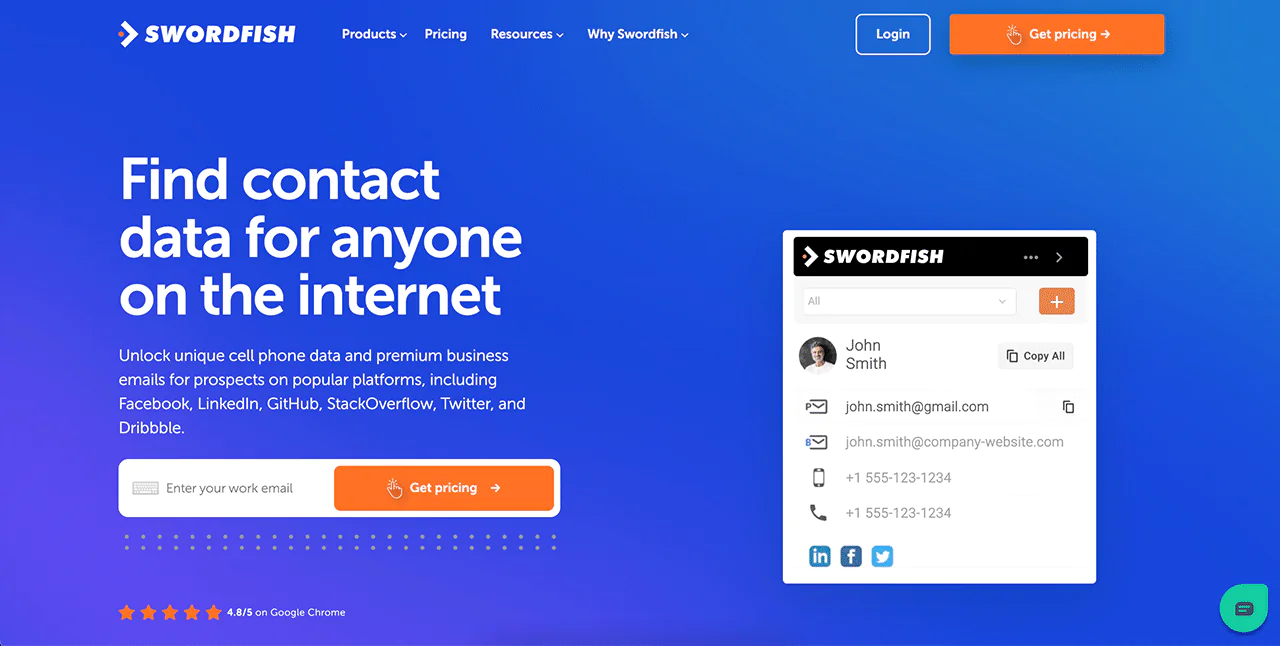
The Chrome extension simplifies finding verified contacts for business email leads. This makes it easier to build prospect lists directly from social media platforms like Facebook and LinkedIn.
Reverse Search
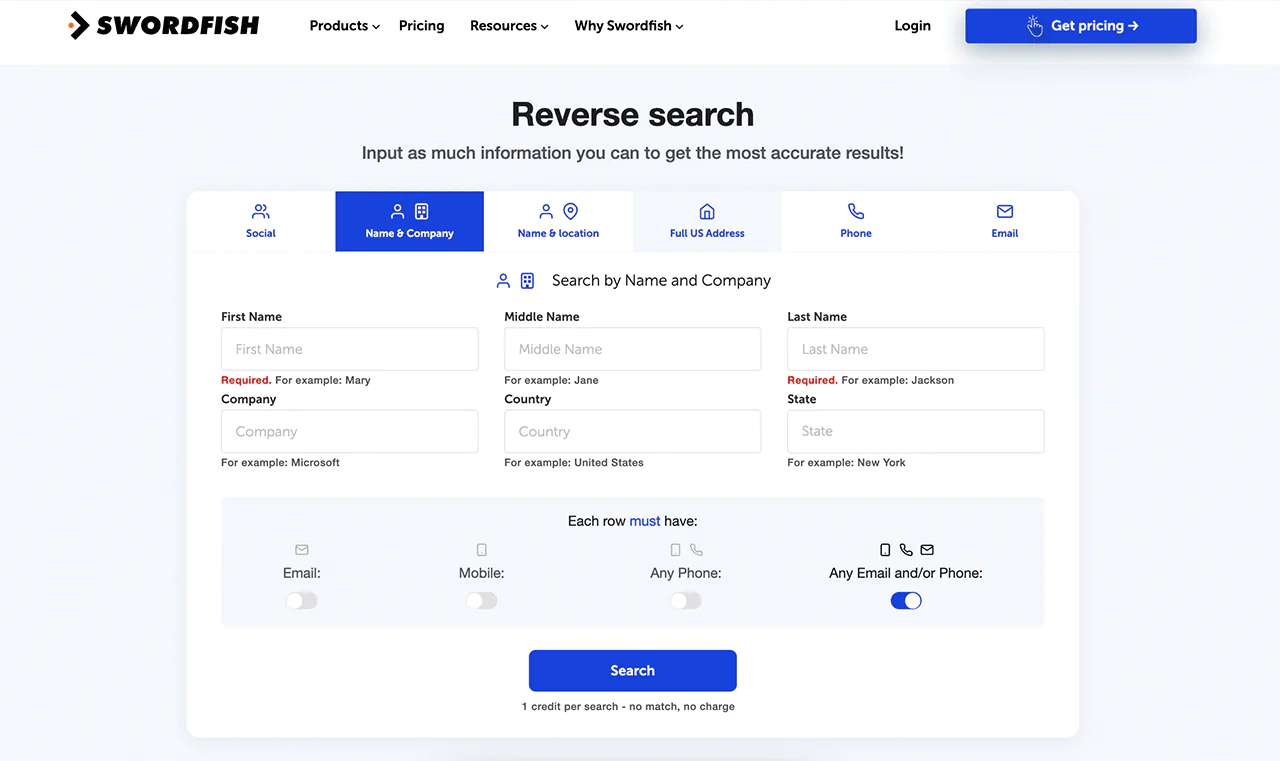
With the Reverse Search feature, you can dive deep into a contact’s information using just a few details. This enhances your ability to connect with the right people in specific industries or regions.
Prospector Tool
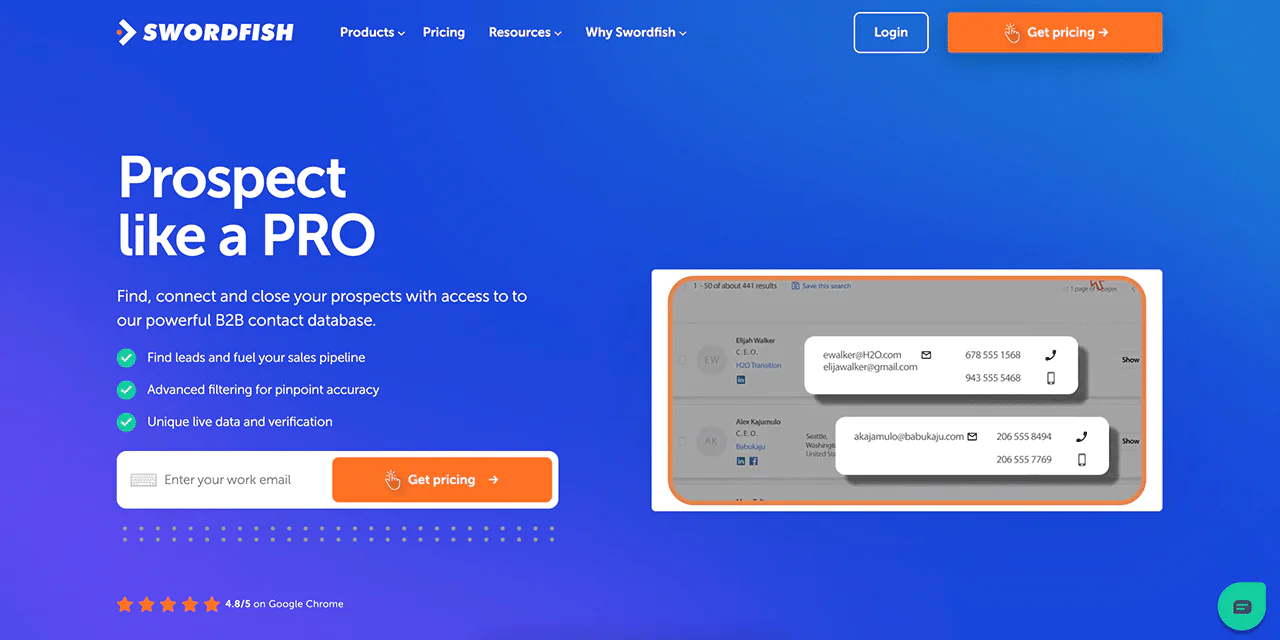
The Prospector tool simplifies the search for potential clients by allowing you to filter by criteria such as industry or location, focusing your efforts more effectively.
Bombora Intent Data
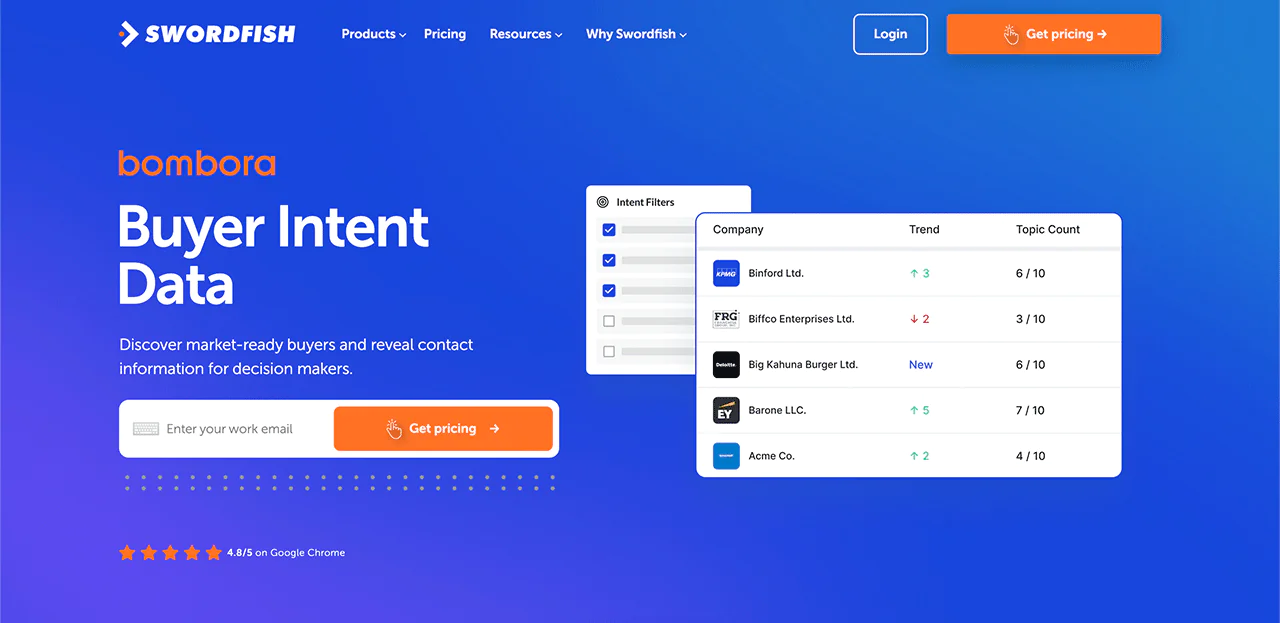
Using Bombora® Intent Data, the tool identifies businesses actively seeking your services, enabling timely and relevant outreach.
File Upload
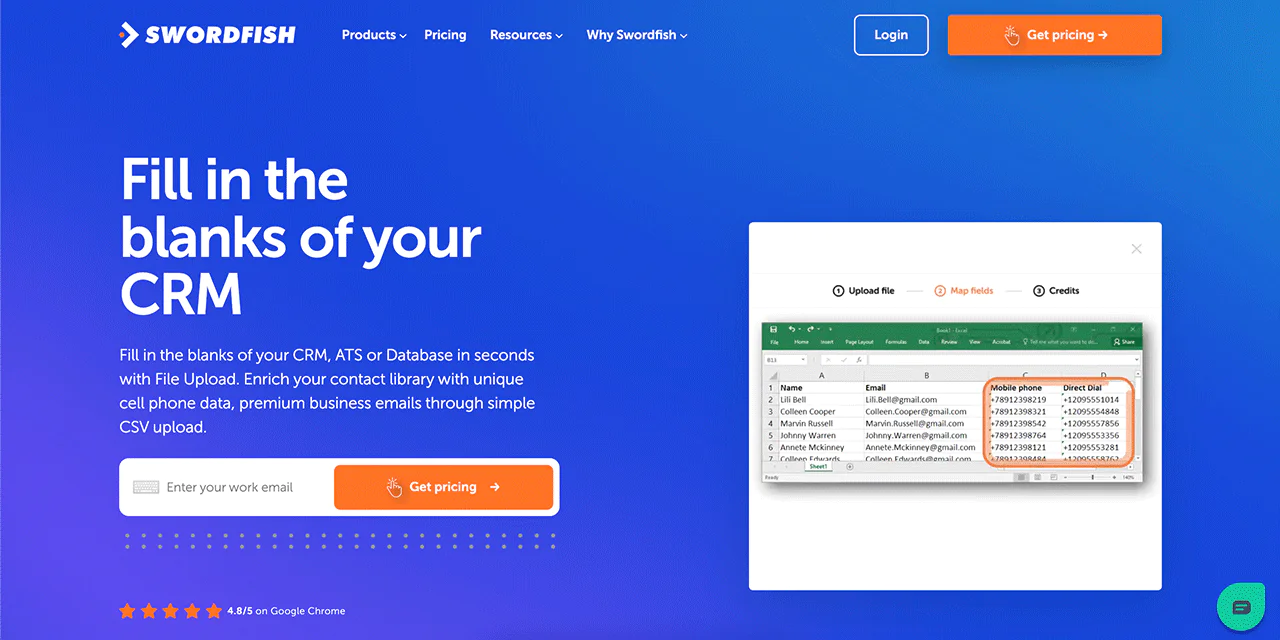
The bulk file upload feature is a boon for managing large volumes of contact information in business. This integrates seamlessly with CRM and ATS systems to keep your data organized and actionable.
API Integration
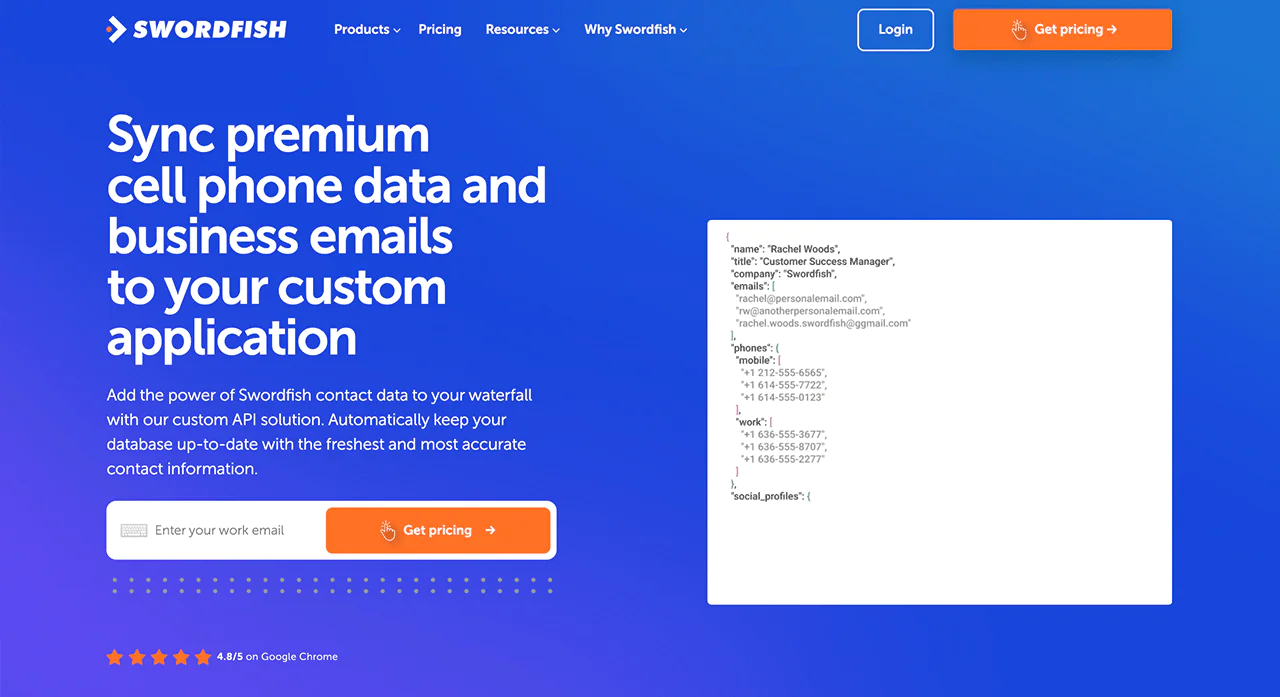
API integration ensures that your marketing tools are always equipped with the updated, most accurate data. This improves the accuracy and efficiency of your lead generation campaigns.
2. Content Marketing
Content marketing is a strategic approach focused on creating and distributing valuable, relevant, and consistent content to attract and retain a clearly defined audience.
By providing content that addresses the needs and interests of potential customers, businesses can encourage website visitors to subscribe to their mailing list.
For example, a digital marketing agency might publish an in-depth guide on improving SEO rankings, offering it for free in exchange for email subscriptions. This method is highly effective. Statistics show that content marketing costs 62% less than traditional marketing efforts while generating three times as many leads.
It not only helps in building a targeted email list but also positions the company as a thought leader in its industry, thereby enhancing brand credibility and customer loyalty.
3. Social Media Campaigns
Utilizing social media platforms for lead generation involves creating targeted advertising campaigns or interactive content that encourages users to provide their email addresses.
For example, a boutique clothing store could launch an Instagram campaign promoting an exclusive online sale for its followers who sign up for their newsletter.
Social media’s power in lead generation is significant, with a 100% higher lead-to-close rate than outbound methods. This approach taps into the vast user base of social media, allowing businesses to reach a broader audience while also engaging with potential customers in a more personal and direct manner.
4. Networking Events
Networking events, whether virtual or in-person, offer a prime opportunity for direct engagement with potential leads. By participating in or hosting such events, businesses can collect email addresses through interactions, sign-up sheets, or business card exchanges.
For instance, an IT solutions provider might attend a technology conference and offer a prize draw for attendees who sign up to their newsletter.
Personal interactions at these events are incredibly effective, with face-to-face meetings yielding a success rate 34 times higher than email communication. This method enables businesses to collect quality leads who have shown a direct interest in their products or services.
5. Referral Programs
Referral programs incentivize existing customers to refer friends or colleagues by offering rewards for each new lead that signs up.
For example, a mobile app company could offer in-app credits to users who refer friends who then sign up for the newsletter.
Referral marketing is highly effective, as studies show that people are four times more likely to make a purchase when referred by someone they trust. This method leverages the existing customer base to expand the list of email with leads that are more likely to convert, given the personal recommendation.
6. SEO and Keyword Optimization
By optimizing website content for search engines, businesses can attract visitors who are actively searching for information or solutions related to their products or services. Incorporating sign-up prompts or forms on these pages can convert visitors into email leads.
For instance, a health and wellness blog might optimize content for keywords like “healthy living tips” and offer a free weekly newsletter on health advice.
SEO leads serve a close rate of 14.6%, significantly higher than the 1.7% close rate of traditional outbound leads. This method ensures that the business email list is populated with individuals who have a genuine interest in the business’s niche, making them qualified leads.
7. Cold Emailing
Cold emailing involves sending personalized emails to potential leads who have not yet interacted with the brand. This requires researching and identifying individuals who match the business’s ideal customer profile.
For example, a B2B software company might send personalized emails to CTOs of small to medium-sized enterprises, introducing their project management tool.
While cold emailing can be challenging, with a well-crafted message and a clear value proposition, the average open rate for cold emails can reach 20-30%. This method is useful to directly reach the right customers, gradually building the email address list with carefully selected, targeted leads.
Who Needs Business Email Leads?
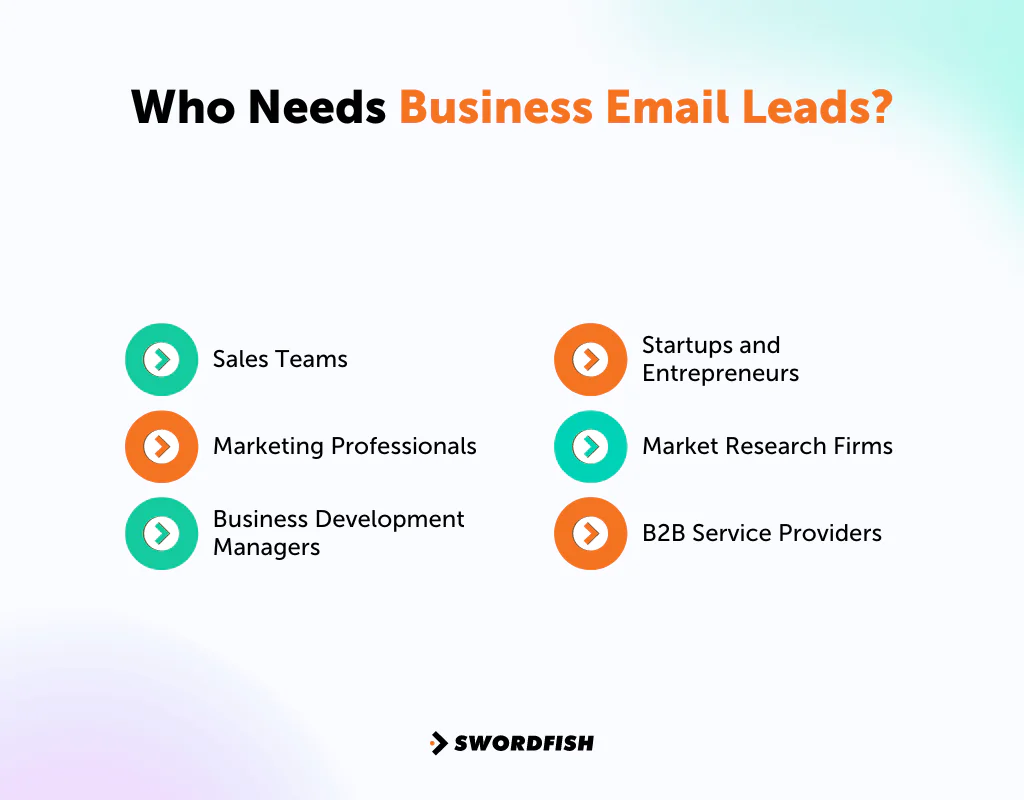
Business email leads are valuable to a wide range of professionals, businesses, and organizations across various industries. Here’s a breakdown of who might need business email leads and why:
- Sales Teams: Sales professionals rely on business email leads to reach out to potential customers, introduce their products or services, and nurture leads through the sales funnel. Email leads help them target the right audience and increase the efficiency of their sales efforts.
- Marketing Professionals: Marketers use business email leads for email marketing campaigns, aiming to promote their brand, products, or services. These campaigns can be customized to different segments of their audience for better engagement and conversion rates.
- Business Development Managers: These professionals seek new business opportunities and partnerships. Email leads allow them to initiate contact with potential partners, investors, or clients to explore new ventures or expand their market reach.
- Startups and Entrepreneurs: For new businesses, building a customer base and finding partners or investors is crucial. Business email leads provide a direct line to potential stakeholders and customers, helping startups to establish themselves in their respective markets.
- Market Research Firms: These firms might use business email leads to conduct surveys, gather market intelligence, or invite participants for focus groups or studies relevant to their research.
- B2B Service Providers: Companies that offer services to other businesses, such as IT solutions, consulting, or financial services, rely on business email leads to find and connect with potential clients.
How Much Do Business Email Leads Cost
The cost of business email leads can vary widely depending on several factors. Here’s a detailed look at these factors and how they influence pricing:
Quality of Leads
- High-Quality Leads: These leads are typically more expensive because they are gathered through more reliable sources, have higher engagement rates, and are more likely to convert into customers. High-quality leads might include detailed information such as company size, industry, job title, and specific interests. Prices for high-quality leads can range from $0.50 to $5.00 per lead or more.
- General Leads: Less targeted and potentially less engaged leads are cheaper but may require more effort to convert. These can range from $0.10 to $1.00 per lead.
Segmentation and Targeting
- Highly Segmented Leads: Leads that are highly segmented based on specific criteria (e.g., industry, job title, geographic location, company size) are more valuable because they allow for more targeted marketing efforts. This level of targeting can increase the cost significantly but also improve the return on investment (ROI).
- Broad or General Leads: Less targeted leads are cheaper but may result in lower conversion rates because they are not customized to a specific audience.
Volume of Leads
- Bulk Purchases: Buying leads in bulk often results in a lower per-lead cost. Providers may offer tiered pricing based on the number of leads purchased, with discounts applied for larger orders.
- Small Quantities: Purchasing leads in smaller quantities is generally more expensive on a per-lead basis. This option might be suitable for small businesses or those with limited budgets.
Provider’s Reputation and Services
- Reputable Providers: Established lead providers with a proven track record of delivering high-quality leads tend to charge more. These providers may also offer additional services, such as lead nurturing tools or integration with customer relationship management (CRM) systems, which can add to the cost.
- New or Less Established Providers: These providers might offer competitive pricing to attract customers but do your due diligence to ensure the quality of the leads.
Pricing Models
- Pay Per Lead: This model charges a set price for each lead, with costs varying based on the factors mentioned above.
- Subscription or Membership Fees: Some providers operate on a subscription model, where you pay a monthly or annual fee for access to a certain number of leads or unlimited leads within specific criteria.
- Custom Lead Generation Campaigns: For highly targeted campaigns, prices are often negotiated based on the complexity of the campaign and the expected volume and quality of sales leads.
Conclusion
Getting top-notch business email leads is key to growing your business and outpacing the competition. Picking the right partner for this job is a game-changer.
We, at Swordfish AI, stand out as one of the best business email leads providers for offering leads that are not only targeted but also impactful. Our dedication to quality means you access prime opportunities to improve your sales.
Embrace the opportunity to elevate your business approach with our support today.
Note: If you are looking to purchase an email list of local businesses, you can check our Local business email list.
Frequently Asked Question
Is it legal to purchase business email leads?
es, it is legal to purchase business email leads. However, it’s important to ensure that the leads are obtained ethically and in compliance with data protection laws.
Can I use business email leads for cold emailing?
Yes, you can use business email leads for cold emailing. But it’s important to craft your messages carefully, provide value, and comply with anti-spam laws by including an opt-out option in your emails.
What is the average conversion rate for business email leads?
The average conversion rate for business email leads varies widely by industry, quality of the leads, and the effectiveness of the email campaign. Generally, a conversion rate of 1% to 5% is considered good, but this can be higher for highly targeted and well-executed campaigns.

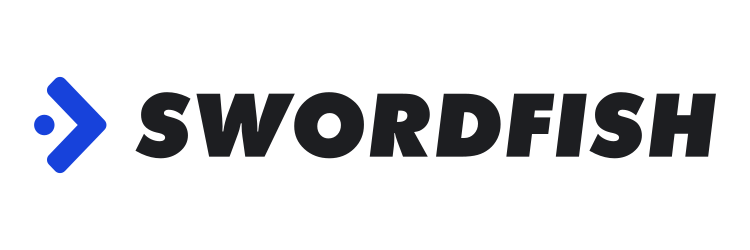
 View Products
View Products


